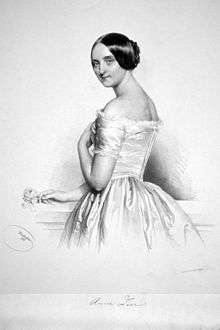Anna Zerr

Anna Zerr (born July 26, 1822 in Baden-Baden , † June 14, 1881 in Winterbach ) was a German opera singer (soprano).
Life
Zerr was a daughter of the organist and music teacher Joseph Zerr, from whom she also received her first artistic lessons. She later joined the choir of the Lichtenthal Abbey School , where she sang a Mozart mass a la vista as a soloist at the age of 12 . Then she became a student with Emma Vigano .
During this time Grand Duchess Stéphanie de Beauharnais became aware of Zerr and encouraged her to the best of her ability. At the expense of the Grand Ducal, Zerr was able to go to the Paris Conservatory to study with Marco Bordogni .
Zerr returned to her hometown in 1839 and made a sensational debut there at the Grand Ducal Court Theater . She sang “Amina” in Vincenzo Bellini's sleepwalker . Then she was taken under contract by the court theater in Karlsruhe . She stayed there until 1846. During this time she made some sensational tours through Germany and the Netherlands. In Amsterdam she heard the singer Franz Wild , who did everything in his power to engage Zerr at the Burgtheater . She was hired to Vienna in 1847 and came to the Theater am Kärntnertor there . One of her greatest successes there was her appearance as "Martha" in Friedrich von Flotow 's opera of the same name. In 1848, at the age of 26, she was appointed kk chamber singer .
During this engagement, Zerr repeatedly undertook highly regarded guest tours abroad. In 1851 she sang in front of the English court at the World Exhibition in London . When Lord Stuart asked her to help Hungarian refugees, she agreed to put on a benefit concert. The refugees, however, were partisans of Lajos Kossuth , who against the absolutist claim of Habsburg had provided. Zerr canceled her promised appearance at the last minute due to an illness, but at the request of Emperor Ferdinand I , the title of chamber singer was revoked with immediate effect.
The Imperial Colonel Chamberlain informed Zerr:
- “Anna Zerr is the decree as a chamber singer, which title she has lost, to remove. The existing contract, according to which she is engaged at the kk opera theater until April 1852, remains in effect for the pleasures promised to her, but she is not allowed to appear at this court theater under any pretext, neither in an opera nor in a concert. The fact that she does not sing on any other stage at this time is in the power of the administration of the opera theater, which would have to grant her permission on a case-by-case basis, which of course she is not given in any conceivable case. "
At that time, Anna Zerr was already considered a " superstar ". The press as well as the audience called her, following Jenny Lind , “the Swabian nightingale” or compared her to Mlle Rachel , “as Rachel of the opera”. The ban on appearing in Austria didn't really hit her hard. She undertook extensive tours a.o. with her own orchestra. a. to London, New York, Los Angeles, Mexico City , Rio de Janeiro and Havana. She returned to Karlsruhe and married in 1858. From this time on she performed less and less and soon withdrew completely from the stage.
Six weeks before her 59th birthday, Anna Zerr died on June 14, 1881 and found her final resting place in the main cemetery in Baden-Baden.
roll
- Amina - La Sonnambula ( Vincenzo Bellini )
- Lucia - Lucia di Lammermoor ( Gaetano Donizetti )
- Queen - The Huguenots ( Giacomo Meyerbeer )
- Martha - Martha ( Friedrich von Flotow )
- Queen of the Night - The Magic Flute ( Wolfgang Amadeus Mozart )
literature
- Constantin von Wurzbach : Zerr, Anna . In: Biographisches Lexikon des Kaiserthums Oesterreich . 59th part. Kaiserlich-Königliche Hof- und Staatsdruckerei, Vienna 1890, pp. 344–346 ( digitized version ).
- Ludwig Eisenberg : Large biographical lexicon of the German stage in the XIX. Century . Verlag von Paul List , Leipzig 1903, p. 1159, ( Textarchiv - Internet Archive ).
- Karl-Josef Kutsch , Leo Riemens : Large singer lexicon . DirectMedia, Berlin 2004, ISBN 3-89853-433-2 (1 CD-ROM).
- Michael Jahn : The Vienna Court Opera from 1848 to 1870. Personnel - performances - program. (= Publications of the Institute for Austrian Music Documentation 27). Tutzing 2002. ISBN 3-7952-1075-5
Web links
- Anna Zerr's short biography
| personal data | |
|---|---|
| SURNAME | Zerr, Anna |
| BRIEF DESCRIPTION | German opera singer (soprano) |
| DATE OF BIRTH | July 26, 1822 |
| PLACE OF BIRTH | Baden-Baden |
| DATE OF DEATH | June 14, 1881 |
| Place of death | Winterbach |